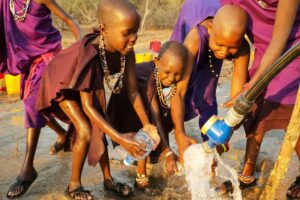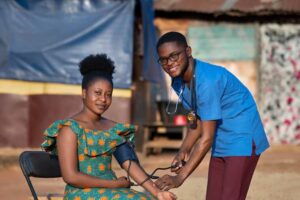Health and Safety: Ensuring Well-Being for Kilimanjaro Climbers and Porters.
- by
Shantel
- No Comments on Health and Safety: Ensuring Well-Being for Kilimanjaro Climbers and Porters.
Many adventurers dream of climbing Mount Kilimanjaro, Africa’s highest mountain. However, the route to its peak is laden with difficulties that need precise health and safety precautions for both climbers and the necessary porters who support these expeditions.
The journey to the peak is strenuous, necessitating cautious planning and a heavy emphasis on health initiatives and safety measures. Ensuring climber and porter safety is not just a moral necessity, but also an essential component of ethical and sustainable tourism.
The demands of high altitude, harsh weather, and strenuous physical exercise necessitate a multifaceted approach to trekking health. From pre-trek preparations to on-mountain protocols, every part of the climb must be carefully studied in order to reduce hazards and provide a safe and pleasurable experience for all. Ensuring the well-being of all parties involved is critical, and several organizations, including Zara Tours and Zara Charity, have taken significant steps to address these issues.
Altitude: The Primary Challenge
The most serious health risk for Kilimanjaro climbers is altitude sickness, often known as acute mountain sickness (AMS). As the body ascends, it experiences decreasing oxygen levels, which can cause headaches, nausea, dizziness, and exhaustion. In severe situations, AMS can lead to High Altitude Pulmonary Edema (HAPE) or High-Altitude Cerebral Edema (HACE), both of which are potentially fatal.
To mitigate these risks, reputable tour operators implement several safety measures:
- Gradual Acclimatization:
- Longer routes, such as the Lemosho or Northern Circuit, are recommended to allow for gradual acclimatization.
- “Climb high, sleep low” principles are followed, where climbers ascend during the day but descend to lower altitudes for sleep.
- Regular Monitoring:
- Guides are trained to recognize the symptoms of AMS and monitor climbers’ health throughout the trek.
- Pulse oximeters are used to measure oxygen saturation levels.
- Emergency Protocols:
- Tour operators carry oxygen tanks and first-aid kits.
- Evacuation plans are in place, including helicopter rescue in case of emergencies.
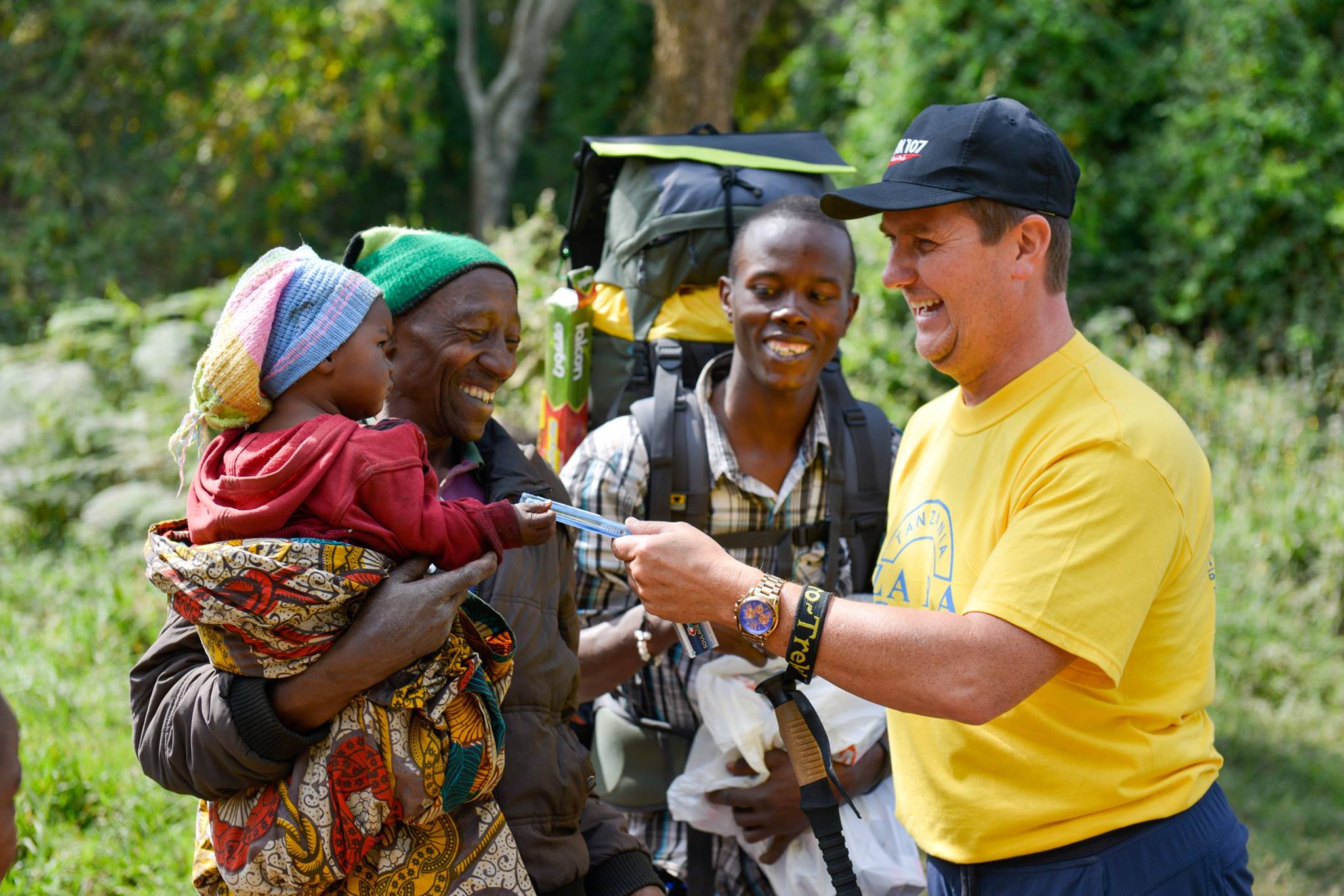
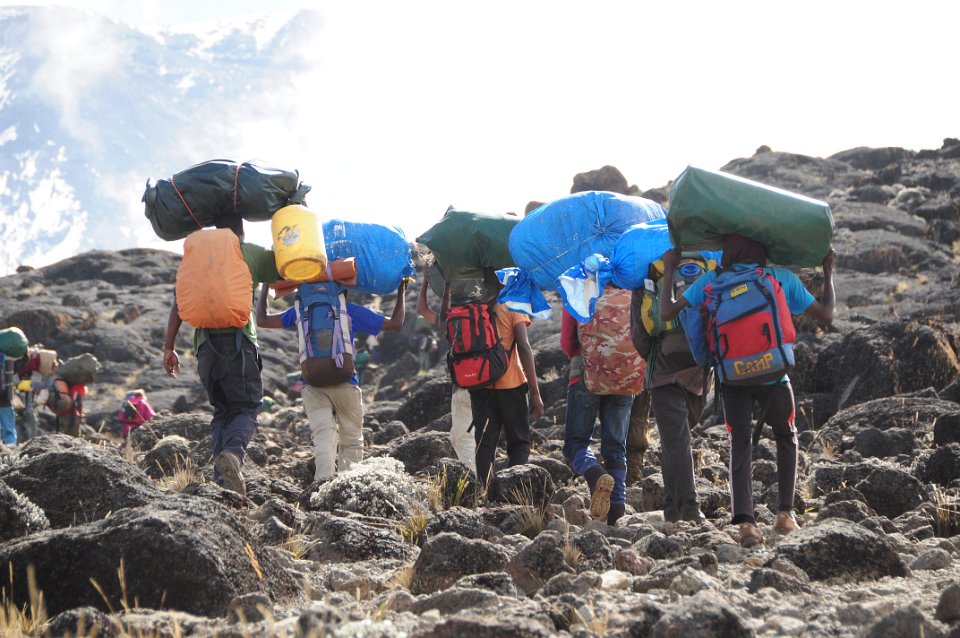
Beyond altitude sickness, other health concerns can arise during Kilimanjaro treks. These include:
- Dehydration:
- Climbers and porters are encouraged to drink plenty of water to stay hydrated.
- Tour operators provide access to clean drinking water.
- Hypothermia:
- Appropriate clothing and gear are essential to protect against cold temperatures, especially at higher altitudes.
- Guides are trained to recognize the signs of hypothermia.
- Injuries:
- Proper footwear and trekking poles can help prevent injuries.
- First-aid kits are carried for minor injuries.
Health Initiatives for Climbers
Climbing Kilimanjaro exposes climbers to extreme elevations, unpredictable weather, and physically hard terrain. To reduce health concerns, numerous programs have been established:
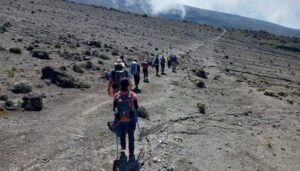
- Pre-Climb Medical Assessments: Climbers should have rigorous medical checks before trying the ascent, according to reputable trip providers. This ensures that people are physically fit and can withstand the hardships of high-altitude trekking.
- Guide-to-Climber Ratios: Maintaining a low guide-to-climber ratio provides for more customized attention and faster response to any health issues that may occur during the trek. For example, some operators maintain a guide-to-climber ratio of one to two, ensuring that each participant’s condition is closely monitored.
- Daily Health Monitoring: Regular health checkups are essential. Every day, guides skilled in high-altitude medicine conduct assessments, checking vital signs like as pulse, temperature, blood pressure, and oxygen saturation. This proactive strategy promotes the early detection of altitude sickness and other potential health issues.
- Emergency Preparedness: It is routine practice to provide hiking teams with vital medical supplies such as first aid kits and emergency oxygen. In addition, established evacuation procedures and helicopter rescue services are in place to respond quickly to severe medical emergencies.
How You Can Help
Supporting Potters initiatives in Tanzania is as simple as getting involved with Zara Charity. Donations, volunteer work, and spreading awareness about the charity’s programs can contribute to changing lives and helping the Potters.
Porters are the foundation of Kilimanjaro trips, carrying big packs and crossing difficult terrain to assist climbers. Ensuring their safety and well-being is both an ethical obligation and a practical requirement:
- Provision of Proper Gear: Organizations like as Zara Tours, through their humanitarian arm Zara Charity, have made substantial efforts to provide porters with high-quality climbing equipment. This involves wearing adequate clothing and equipment to protect themselves from the harsh alpine environment, which lowers the risk of hypothermia and other cold-related diseases.
- Fair Compensation and Working Conditions: Advocating for fair pay and decent working conditions is critical. The Mount Kilimanjaro Porters Society (MKPS), backed by Zara Charity, aims to empower porters via education, healthcare, financial literacy, and environmental awareness. Their objective is to build a sustainable future in which people can overcome poverty and achieve financial independence.
- Health and Safety Training: Educating porters on health and safety regulations guarantees that they are adequately prepared to face the demands of the climb. This training covers altitude sickness awareness, first aid, and emergency response techniques, preparing them to protect their own well-being while also efficiently assisting climbers.
Collaborative Efforts and Responsible Tourism
The collaboration of tour companies, philanthropic groups, and the local population is critical to promoting a culture of safety and well-being on Mount Kilimanjaro:
- Zara Tours and Zara Charity: Zara Tours, a renowned travel operator, integrates social responsibility into its operations. Zara Charity donates a portion of their revenues to local communities, supporting education, healthcare, and environmental protection projects. This comprehensive approach guarantees that tourism benefits the entire community, not only climbers.
- Environmental Conservation: Sustainable tourist practices are essential for conserving Kilimanjaro’s ecology. Tree-planting projects and garbage management programs are developed to reduce the environmental impact of trekking activities.
- Community Empowerment: Tour operators contribute significantly to good change by collaborating with groups such as MKPS and Zara Charity. These alliances aim to improve working conditions, increase livelihoods, and promote community-led environmental conservation activities.
Join Zara Charity today and be a part of this transformative
Porter Safety: A Matter of Ethical Responsibility
Porters, who transport crucial supplies and equipment, are critical to the success of Kilimanjaro hikes. However, their physical demands are considerable, and their safety must be addressed.
Porter safety is a vital component of ethical tourism and is receiving increasing attention. Organizations such as the Mount Kilimanjaro Porters Society (MKPS) push for fair treatment and better working conditions for porters.
Responsible tour operators, like Zara Tours, implement policies that prioritize porter safety:
- Weight Limits:
- Strict weight limits are enforced for porter loads to prevent overexertion.
- Proper Gear:
- Porters are provided with appropriate clothing, footwear, and equipment to protect them from the elements.
- Fair Wages and Working Conditions:
- Porters are paid fair wages and provided with adequate food and shelter.
- Rest periods and breaks are incorporated into the daily schedule.
- Health Checks:
- Regular health checks are done to ensure the porters are fit and healthy.
The Role of Tour Operators and Organizations
Tour operators play an important role in guaranteeing climbers’ and porters’ safety. Reputable businesses stress safety and ethical procedures.
Zara Tours, for example, is dedicated to responsible tourism and has adopted a number of health initiatives and safety measures. They also support Zara Charity, which works to improve the lives of local residents via education and healthcare. This displays a comprehensive strategy to tourism that benefits both climbers and the local population.
Organizations such as MKPS work relentlessly to promote porter safety and equitable treatment. Their initiatives have resulted in better working conditions and a greater understanding of the value of ethical tourism.
The Climber's Responsibility
While tour operators and organizations play a vital role, climbers also have a responsibility to prioritize their health and safety. This includes:
- Pre-Trek Preparation:
- Consulting with a doctor to assess fitness levels and discuss potential health risks.
- Training and conditioning before the trek.
- Packing appropriate clothing and gear.
- On-Mountain Awareness:
- Listening to guides and following their instructions.
- Communicating any health concerns to guides.
- Pacing oneself and avoiding overexertion.
- Staying hydrated and eating properly.
The Importance of Sustainable Tourism
The long-term viability of Kilimanjaro tourism is dependent on emphasizing the health and well-being of climbers and porters. By embracing ethical and responsible methods, we can ensure that future generations can enjoy this great experience safely and comfortably.
Trekking health and porter safety are not abstract terms; they are critical to the integrity of Kilimanjaro tourism. By selecting responsible tour operators, supporting groups like MKPS, and prioritizing our own well-being, we can help to shape a more ethical and sustainable future for this renowned location.
We can establish a tourism sector that honors the people and the mountain that makes it possible by implementing strong safety measures, supporting vital health initiatives, and focusing on both climber and porter well-being.


